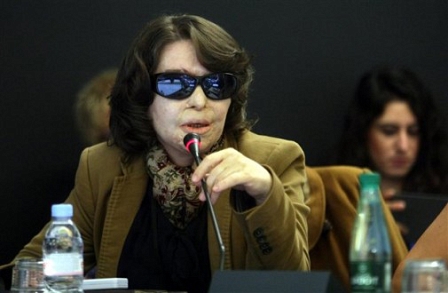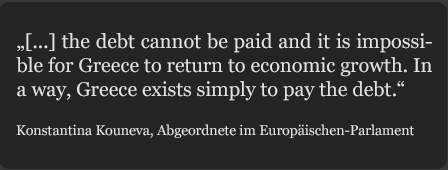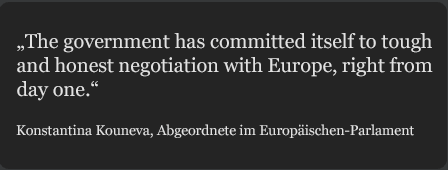Erstellt am: 6. 2. 2015 - 11:13 Uhr
"Griechenland existiert nur, um Schulden zu zahlen"
Zum Weiterlesen:
- "Biblical economics leave everybody blind": Johanna Jaufer interviewt den griechischen Finanzminister Gianis Varoufakis
- "I Don't Know What You Heard About Me": Die spektakuläre Memifizierung des griechischen Finanzministers Gianis Varoufakis
Der Verhandlungspoker zwischen der neuen griechischen Regierung und den Gläubigern geht weiter. Athen fordert ein Überbrückungsprogramm bis Ende Mai, damit Griechenland Zeit bekommt, eigene Vorschläge zur Lösung der Schuldenkrise vorzulegen. Derweil hat am Mittwoch die Europäische Zentralbank (EZB) den Druck auf Griechenland erhöht, sie hat bekannt gegeben, ab 11. Februar griechische Anleihen nicht mehr als Sicherheit für neues Zentralbankgeld zu akzeptieren. Kurz darauf traf der neue griechische Finanzminister Gianis Varoufakis seinen deutschen Amtskollegen Wolfgang Schäuble in Berlin. "Wir sind uns einig, dass wir uns nicht einig sind", so Schäuble über das Ergebnis dieses Treffens.
In Athen und anderen Städten Griechenlands finden erste Kundgebungen für die Regierung statt, mit dem Motto: "Wir lassen uns nicht erpressen, wir haben keine Angst".
Wie aber ist die Stimmung im europäischen Parlament? Chrissi Wilkens und Bostjan Videmsek haben mit der EU-Abgeordneten des Linksbündnis SYRIZA, Konstantina Kouneva ein Interview geführt, einer Symbolfigur für viele GriechInnen.

K. Kouneva
Kouneva ist 2001 wegen ihres kranken Kindes aus Bulgarien nach Griechenland gekommen. Sie hatte in Bulgarien Geschichte studiert und in Athen als Reinigungskraft bei der Athener Metro gearbeitet, um Geld für die medizinische Behandlung ihres Sohnes zu verdienen. Die Gewerkschafterin wurde 2008 Opfer eines Säureattentats, zwei Männer haben ihr Schwefelsäure ins Gesicht geschüttet und sie gezwungen, die Säure zu trinken. Kouneva lag mehrere Tage im Koma, ist seitdem auf einem Auge blind und hat eine beschädigte Speiseröhre. Das Attentat wurde nie aufgeklärt, auch eine Wiederaufnahme des Verfahrens half nicht. Bei den Europawahlen im Mai 2014 wurde sie für SYRIZA ins EU-Parlament gewählt.
Chrissi Wilkens/Bostjan Videmsek: How is the atmosphere in the EU parliament considering the Greek election results?
K. Kouneva: It is completely different. Since the European elections, SYRIZA’s victory has put it in the spotlight, but now SYRIZA is government, and the Ministers and the Prime Minister are traveling to meet with the other leaders to discuss the Greek situation. My fellow MEPs hope that the European leadership will change their current way of thinking. They are all tired of austerity and they see (the victory of SYRIZA) as an opportunity for change.

And how do your colleagues in EU parliament see the austerity politics, and the program that has been implemented in Greece? Do they believe it’s a successful program or not? And what about the debt?
I don't believe there is anyone who can seriously claim that the (economic) program has succeeded in Greece. They know that the debt cannot be paid and it is impossible for Greece to return to economic growth. In a way, Greece exists simply to pay the debt. The problem is that the loans that have been given to Greece are a burden on taxpayers in other countries. And exactly for this reason, my fellow MEPs have difficulties supporting a debt haircut. But SYRIZA wants exactly this: to discuss a solution that will stop burdening the citizens of the EU.
In recent days we notice solidarity from France and the USA. What kind of solidarity can Greece expect from European countries regarding the end of the austerity politics and a new haircut, in your opinion?
It is not exactly solidarity but a support for their interests, even though the result is the same. Most countries want somehow to put an end to austerity because otherwise they will return to recession themselves. And the US, that has managed to achieve remarkable growth, is afraid that if Europe returns to recession, it will affect the US negatively. Concerning the debt haircut, however, things are more difficult and more complicated. Of course, you know that Germany insists on severe austerity policies. It appears intolerant, something predictable in negotiations, which will be hard and long lasting.

Is Syriza united enough to stand the pressure from outside and inside, considering the two different economic schools/ideas inside the party (Varoufakis/Lapavitsas)?
I do not know in detail the differences in the views of economists of SYRIZA, and I don't think that in this moment these differences are important. We all have our opinions, but now we have one program which people voted for and one government that will try to implement it. The government has committed itself to tough and honest negotiations with Europe, right from day one. We have already seen the results and we support these efforts, both MPs and MEPs.
Inside and outside Greece, some analysts speak about a left parenthesis, a short left government. What kind of factors could lead in a scenario like that in your opinion?
The first danger is losing sight of ourselves. If we do not work in a methodical way and we don’t implement immediate measures to relieve the weakest members of Greek society quickly, measures that gave hope to the people, we will lose their support. We will disappoint them. The second danger is to appear intransigent to our partners, especially the Germans, and to bring the country to a state of suffocation, without money. This would cause negative repercussions in the whole Eurozone. It would be an irrational attitude.
What does the victory of Syriza mean for you on a personal level? And what should be the government's priorities now?
The victory of SYRIZA was a personal vindication for me, that seven months ago I chose to be nominated and was elected to the EP. It proved the right choice for me and expresses the expectations for the majority of people. Concerning the priorities, first and foremost government must achieve a good deal with Europeans over the debt. Continuing, the government must restore labour rights, bring in fair levels for wages and create new jobs.
How will Syriza's victory affect the homeless and immigrants in Greece in short and long term?
The government has promised to ban home auctions, to avoid creating new homelessness. Also, the government in direct way will deal with those who are already homeless and with immigrants who are living in unacceptable detention centres. We want real hospitality, not a prison. The immigrants are not criminals, they are victims of war and poverty. And then, the government will bring this issue to Europe in order to put an end to the hypocrisy of the Dublin Regulation which traps immigrants in Greece, when their destination is in other countries.

Syriza got the mandate from the people. Do you agree that now it's time to give the mandate back to the people and invite all the solidarity and social movements to be part of the new Greece?
It is really true what you say. The best allies of this new government are the active citizens themselves who must assert their rights, organize their solidarity, defend their rights and take initiatives in order to create new perspectives. The best thing that government can offer to these citizens is the possibility to demand.


